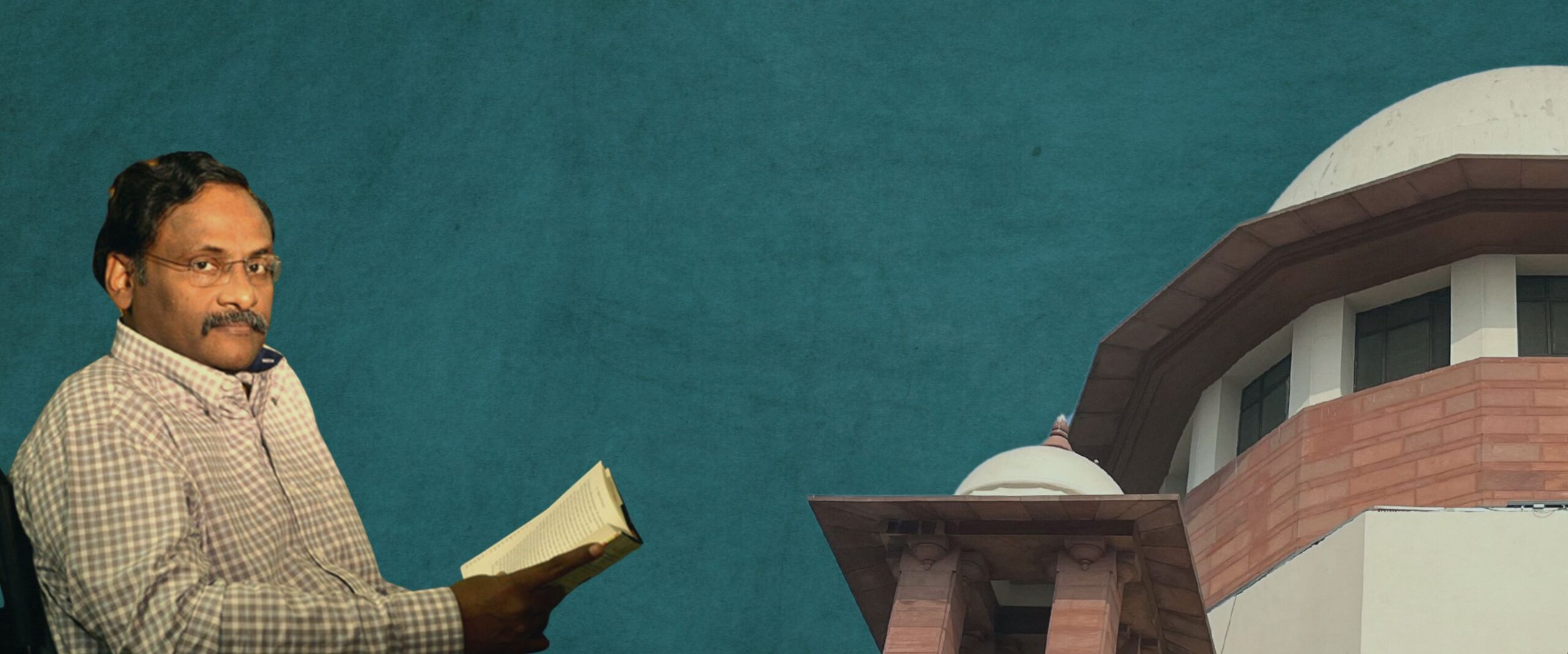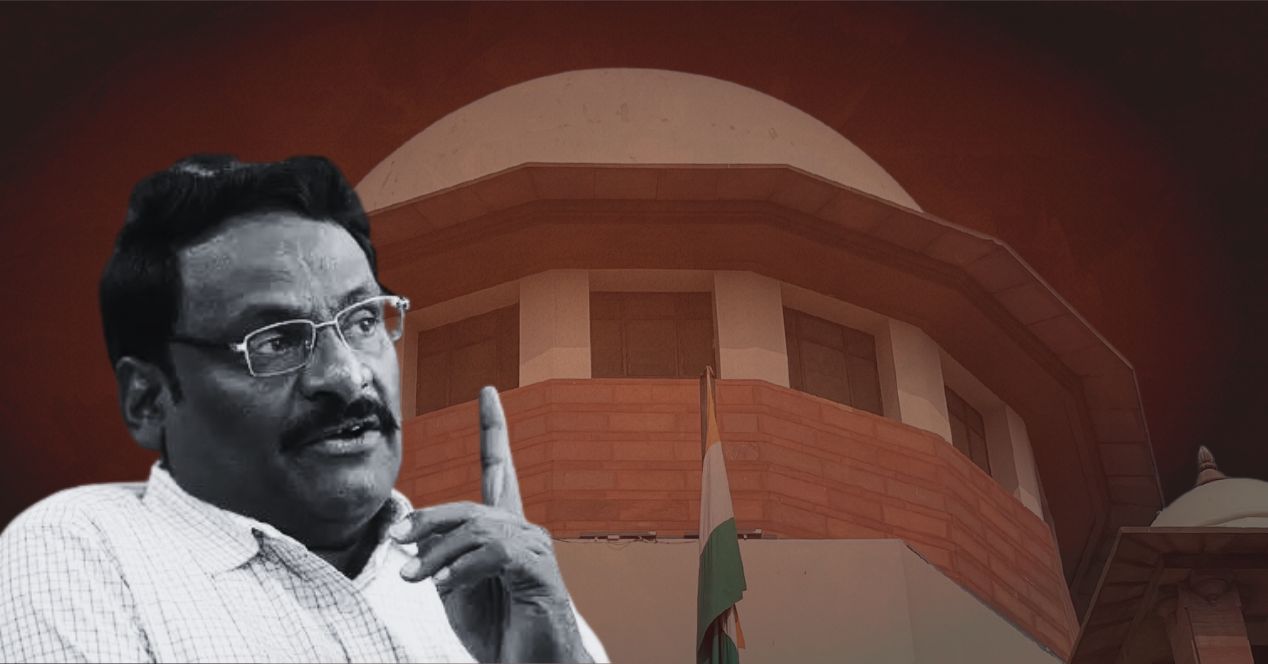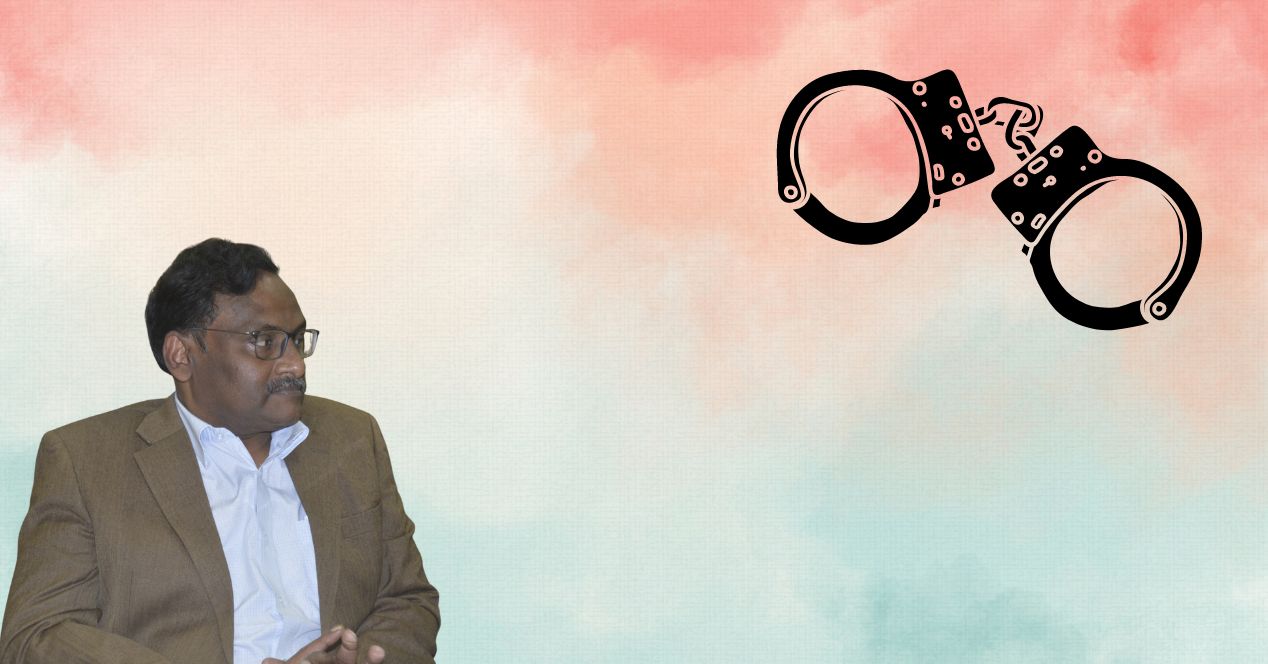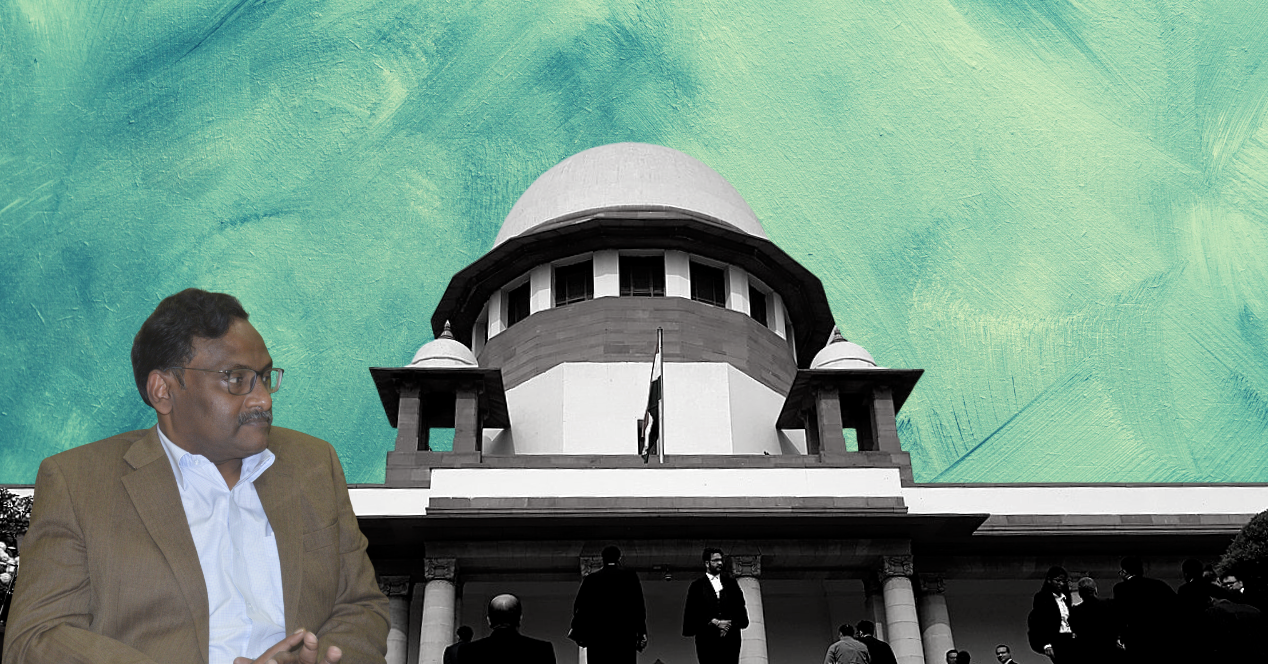Analysis
A decade in incarceration: How justice failed Professor G.N. Saibaba
Saibaba speaks about how bail for the marginalised is a major blind spot for the Courts

“For more than eight and a half years, I saw the suffering, not just of myself, but all the people in that prison,” GN Saibaba told me. Saibaba, a former Delhi University professor, was arrested along with five others under Section 18 of the Unlawful Activities (Prevention) Act, 1967 alongside other criminal provisions in 2014. He spoke to me on 9 March 2024, two days after his release from the Nagpur Central Jail. The Nagpur bench of the Bombay High Court, for the second time in two years, acquitted him, ending the 90 percent disabled professor’s 10 years in custody, much of which was in solitary confinement.
The acquittal judgement was again appealed within a span of a few hours and the fate of Saibaba once again landed at the Supreme Court. On 11 March 2024, the apex court refused to stay his acquittal, as the Bench observed that the lower court judgement was “well-reasoned”. The prosecution also did not make a special application to stay his acquittal this time.
Saibaba spoke to the Supreme Court Observer about his case and the costs that India’s legal and carceral systems have on many like him. “Prisons reflect how timely justice is completely missing,” Saibaba told me. “As a result, the fundamental rights guaranteed under the Constitution are violated. Unless you have fundamental rights guaranteed, you cannot move towards democratic rights.” Among his main aspirations, he said, was a desire to engage with the reform of legal institutions, and recognise the role of the Supreme Court in it.
In his 5 March 2024 acquittal, a division bench of Justices Vinay Joshi and Valmiki S.A. Menezes ruled that apart from “vague allegations” of conspiring to wage war against the government, no tangible material to establish any “preparatory act” for conspiracy was found. They also noted that the mere finding that the accused were acquainted with each other, and the fact that the terrorist act was “not spelt out” proved a weak case for the prosecution. Despite this clear-cut observation, over the last decade, Saibaba’s trial had dragged its feet, often coming to unceremonious halts, painting an ominous picture of terror litigation in India.
Medha Deo, the Programme Director of the Fair Trial Fellowship at Project 39-A, said that Saibaba’s trial reinforces “the understanding that there is a huge gap between the way the criminal justice system functions and how it ought to function under the constitutional framework.”
“This story is a series of tragedies,” Senior Advocate Mihir Desai who represented Professor Saibaba before the Bombay High Court said. “The first tragedy of the whole thing was that he was arrested and convicted in the first place. If the High Court found the case frivolous on merits, there is no reason the trial court could not have come to that conclusion.” This is something Saibaba’s defence and those advocating his release have argued for a decade.
Speaking to me back in January 2023, A.S. Vasanta Kumari, Professor Saibaba’s wife asserted, “He has committed no crime, he has committed no violence.” She recounted what she must have told countless other reporters, lawyers, police officers and judges. “These are all the assumptions of the State.”
On 14 October 2022, a Division Bench of the Bombay High Court had first acquitted Professor Saibaba and the five others. The Bench noted that because the sanction to proceed with the case was granted after the conviction of proceedings had begun, the entire conviction by the trial court, and the subsequent sentencing for life imprisonment in 2017, was “null and void.” This acquittal had come as a huge relief. Besides suffering from chronic conditions inflicted by diabetes and hypertension, Saibaba had suffered an internal injury during the time of his arrest, causing a form of paralysis in his left arm, according to Kumari. But the celebrations that followed the release order did not last long.
Within hours, the Maharashtra government had filed a petition at the Supreme Court challenging the High Court’s Order. What followed was an absurd pursuit of urgency. Solicitor General Tushar Mehta first tried mentioning the matter before Chief Justice U.U. Lalit’s Bench, but the Court had concluded proceedings for the day. Mehta then approached Justice D.Y. Chandrachud’s Bench. Here also, the request to stay the High Court Order was rejected, but he was allowed to apply for an early hearing before the CJI. The Bench noted that they could list the matter on Monday, but explicitly noted that even if they were to hear the case on Monday, they would not be staying the acquittal Order.
But in an unusual turn of affairs, a special Saturday hearing was hurriedly put together by CJI Lalit to be presided over by Justices Bela Trivedi and M.R. Shah. CJI Lalit later claimed that they were the only two judges available for the matter. “The absurdity of the Saturday hearing was the urgency,” said Desai, “Even if you had released him for two days, would he have run away? He is a senior gentleman, 90 percent disabled.”
The Special Bench held that the High Court had erred in focusing solely on the procedural errors and hence had incorrectly ignored the merits of the case. It then asked a new High Court bench to hear the case based on its sanction and merits. The Supreme Court bench, in their comments, said that a person’s “brain” was the “most integral part of committing terrorism-related offences.” A mere house arrest for a disabled senior citizen such as Professor Saibaba was not good enough. He was sent back to prison. Even as Senior Advocate R. Basant for Saibaba proposed to cut all phone lines to the residence, the High Court Order was stayed.
“Ultimately, everybody has a right to conscience,” Desai said. “Believing something without acting on it cannot be a crime. Belief is never criminalised under the law.” Desai told me that even if one ignores the circumstantial absurdity of the Saturday hearing, the Order that came out of it was more legally baffling. “I had never before come across something like this,” he said. “How can you stay an acquittal? The State put forward its standard arguments of national security. No matter what the merits were, these arguments were accepted.”
Saibaba’s trial and incarceration will be etched in history. It was a relentless decade-long pursuit during which the Courts had to ponder over and over again to decide if he could be allowed to step out of prison.
Deo believes Saibaba’s ordeal reflected the Supreme Court’s complicated institutional standing on bail. “Despite liberal judgements of the Supreme Court emphasising the approach of ‘bail not jail,’ our experience on the ground indicates a general reluctance amongst judges in granting bail, especially for people without property or propertied connections,” she said. “The discretionary powers enjoyed by judges in deciding on matters of bail mostly tilt towards ensuring that the accused should not abscond and are rarely used to give the benefit of the doubt in favour of balancing the individual’s liberty. The approach becomes even stricter when exceptions carved under special acts, such as PMLA and UAPA, validate the stricter approach and in some cases also reduce the scope of discretion by shifting the presumption against the accused. In a recent speech, Justice Abhay S. Oka remarked how judges are under a lot of pressure to deny bail.”
In 2020, the High Court denied the Professor an emergency bail, and the Nagpur prison authorities did not allow him a video call to see his mother for the last time before her death. These moves had a deep and lasting impact on Saibaba and Kumari. The Supreme Court’s Saturday hearing was a subject he was still emotionally unprepared to talk about. “It’s still too heavy for me to talk about that,” Saibaba said. “I am still recovering from that grief, from that heaviness.”
I spoke to Kumari a few weeks after the Saturday hearing. She told me that in the two months following the hearing, Professor Saibaba was taken to the Nagpur government hospital six times. “The doctors have requested that he be taken out of jail,” she said. “In August 2022, he got a severe continuous fever. Because of that, he became susceptible to COVID also. From COVID he never recovered, he continuously caught cold and fever, he would fall unconscious suddenly, and have blackouts.”
As the professor’s rheumatism had gotten worse, doctors at the prison had verbally suggested shifting him to AIIMS, Delhi for treatment. Even so, no written reports were ever given to the family. Instead of medical care, what Saibaba had was solitary confinement in a chilly cell with high barracks and an egg-shaped window near the roof through which the winter night’s cold air blew in harshly. “He moves from his wheelchair to bed; bed to commode,” Kumari told me. “He needs round-the-clock assistance. Even at this crucial junction, his medical bail is being rejected.”
Now, upon his release, his health remains tenuous. “I have been suffering. I have been suffering for several several months now,” Saibaba told me. “I am in a very very bad condition, there are several complications that I’m going through.”
Saibaba told me that among his main aspirations was a desire to engage with the reform of legal institutions and recognise the role of the Supreme Court in it. He asserted that 80 percent of the prisoners at the Nagpur Central Jail, where he was housed, belonged to the most backward communities and were kept in for the pettiest of crimes. “Some of them have been languishing in jail for five years, seven years, eight years without trial,” he said.
Deo, whose team has worked on issues in the Nagpur prison stated that the problem was both systemic and legal in nature, “For offering any solution to this problem, the system first needs to reflect and acknowledge, firstly that people’s socio-economic position makes them vulnerable to being caught on the wrong side of the law.” “Secondly,” she continued, “the current structure of the system makes it extremely difficult for people from socio-economic marginalised communities to navigate the system and enforce their rights. There still exist valid provisions of law which perpetuate discrimination.” She gave the examples of police manuals for profiling of offenders on grounds of criminal antecedents. Saibaba told me, “I have lost ten years of my life. I am one of them. It’s an example…a reflection of how our Courts are lagging behind.”
Saibaba’s views about the failure of Courts in India are detailed in an interview with him here. Layered within his criticisms was a structured belief in the image of the Supreme Court—an institution that had not only monitored judicial injustices in the past but as one that could lead the reforming of key legal institutions. It was a similar veneer of this subtle but undeniable hope in the Court as an institution that I had also witnessed in Kumari’s voice, more than a year ago.
“The State has its hands everywhere,” Kumari had said. “Maybe that’s why we have been constantly betrayed by every institution. But we live in a democratic country. We believe some justice will prevail at some point.” Despite the Saturday hearing, she had expressed hope in the top Court, “hume umeed hai ki Supreme Court me justice mil jayega”—we have hope that we will get justice from the Supreme Court.
Despite Saibaba’s acquittal, a lot continues to remain at stake. Desai believes that the Nagpur High Court Order does not merely acquit, but indicts as well. “The tenor of the judgement suggests that he was falsely implicated,” Desai said. “If that is the case, why shouldn’t actions be taken against the police, those who investigated the case?”
For Professor Saibaba, the appeal trial in the Supreme Court seems to be less so about himself and more about the possibility of his aspirations becoming achievable. His foremost aspiration, as he told me, was to continue engaging as an educationist, something he had done throughout his life. “I will continue to teach,” he told me. “There are no tangible plans—I don’t know the ‘wheres’ and the ‘whats.’ Those depend on how things turn out in the appeal hearings. But for sure, I will continue to teach.”




